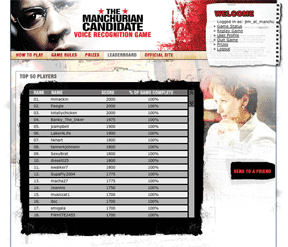Manchurian Candidate
Project type:
Movie promotion
In support of:
Manchurian Candidate (Paramount)
Date:
Spring-Summer 2004
Description:
The campaign for the remake of Manchurian Candidate is making substantial use of immersive techniques in addition to the standard "press kit" features. The main site for the movie is augmented by two interesting immersive events:
A section labeled "Enter the Experience" takes the visitor to a set of cross-linked pages, heavily themed with graphics and sound to evoke the mystery / conspiracy at the heart of the movie. There's no "goal" to moving through the pages (at least none that I can find) -- the point is simply to poke around and explore, much as was done in Myst, or the promotional site for Memento a few years back.
takes the visitor to a set of cross-linked pages, heavily themed with graphics and sound to evoke the mystery / conspiracy at the heart of the movie. There's no "goal" to moving through the pages (at least none that I can find) -- the point is simply to poke around and explore, much as was done in Myst, or the promotional site for Memento a few years back.
As you explore the pages, the bits of image and sound you encounter do a powerful job of conveying the sense of tension and danger you'll encounter in the movie. In a way, it also convinced me that the movie as a whole was going to be a solid piece of work. Despite the high-caliber people involved in this production, Manchurian Candidate was near the top of my list of movies that really didn't need to be remade, but I'll confess that the quality and power of this part of the site made me feel quite differently. Excellent job! (By the way, if anybody knows what "75435" means. let me know....)
In addition, the producers are running an innovative telephone-based game that uses sound clips taken from or based on the movie to place the player in the position of Marco, the movie's lead character, and force them to make many of the same decisions that Marco must make. By registering for the game, you agree to receive phone calls from an interactive voice response system. The calls are themed as phone calls from characters in the movie, telling you (that is, the Marco character) things and asking you to do things in response.
Marco, the movie's lead character, and force them to make many of the same decisions that Marco must make. By registering for the game, you agree to receive phone calls from an interactive voice response system. The calls are themed as phone calls from characters in the movie, telling you (that is, the Marco character) things and asking you to do things in response.
It's something of a phone-based "choose your own adventure" game -- for instance, in the first call, you are contacted by an Army buddy from your company in Desert Storm who has been having very strange dreams. They're driving him crazy, and he wants to know what he should do -- get together with you, or go to the VA hospital? In the game, one of these options is the "safe" path, and one is the "dangerous" path; you make your choice verbally, by saying something like "go to the VA hospital". The system has a set of choices it considers likely responses, and is ready to prompt you with specific things to say if you say something totally unexpected or if telephone problems interfere with the voice recognition system. If you pick safe paths, you earn points and can continue with the game; if you make two dangerous choices in a row, the game ends for you (although you can go back to the website, reset your account, and try again). As you progress through the game, you earn entries into a sweepstakes, and your name can appear on a "leader board" of high-scoring players.
This game worked for me in a way that many movie promotion games didn't -- getting a phone call, listening to (what seems to be) someone talk to me, and verbally responding -- drew me in. The designers also did a good job of making sure the game fit in with how people would be willing to deal with a phone-based game. When you register, you specify a two-hour block of time when you are willing to be called by the game. You then receive an immediate call from the game requiring you to confirm your registration; this deals with mis-entered phone numbers and bogus registrations. When a game call arrives, you have the option of playing, quitting, or having the system call you back at a later time. If you don't respond or if the call rolls over to your answering machine, you're given a phone number that you can call to pick up the game where you left off. There are also options for web-based play, so that people joining the game after it has started can quickly catch up to the "current" point in the game. This is essential to gain the benefits of a group of friends all playing the game and sharing their experiences.
From a design and user experience perspective, this is another excellent job; the designers found a way to use a rather simple technology base to produce an impressive immersive effect. On the other hand, it's not clear that the campaign is being very effective. When I checked back onto the website after having played a few rounds of the game, I discovered that I was ranked "306 / 1559". It's not at all a good sign for the campaign if less than 1600 people are playing it, especially in view of the strong promotional placement the game received on the home page of the main movie site.
If all of this weren't enough, a faux web site for Manchurian Global, the evil corporation at the heart of the movie's conspiracy has been found. I'll discuss this in a separate Museum entry, referenced below.
A section labeled "Enter the Experience"
 takes the visitor to a set of cross-linked pages, heavily themed with graphics and sound to evoke the mystery / conspiracy at the heart of the movie. There's no "goal" to moving through the pages (at least none that I can find) -- the point is simply to poke around and explore, much as was done in Myst, or the promotional site for Memento a few years back.
takes the visitor to a set of cross-linked pages, heavily themed with graphics and sound to evoke the mystery / conspiracy at the heart of the movie. There's no "goal" to moving through the pages (at least none that I can find) -- the point is simply to poke around and explore, much as was done in Myst, or the promotional site for Memento a few years back. As you explore the pages, the bits of image and sound you encounter do a powerful job of conveying the sense of tension and danger you'll encounter in the movie. In a way, it also convinced me that the movie as a whole was going to be a solid piece of work. Despite the high-caliber people involved in this production, Manchurian Candidate was near the top of my list of movies that really didn't need to be remade, but I'll confess that the quality and power of this part of the site made me feel quite differently. Excellent job! (By the way, if anybody knows what "75435" means. let me know....)
In addition, the producers are running an innovative telephone-based game that uses sound clips taken from or based on the movie to place the player in the position of
 Marco, the movie's lead character, and force them to make many of the same decisions that Marco must make. By registering for the game, you agree to receive phone calls from an interactive voice response system. The calls are themed as phone calls from characters in the movie, telling you (that is, the Marco character) things and asking you to do things in response.
Marco, the movie's lead character, and force them to make many of the same decisions that Marco must make. By registering for the game, you agree to receive phone calls from an interactive voice response system. The calls are themed as phone calls from characters in the movie, telling you (that is, the Marco character) things and asking you to do things in response. It's something of a phone-based "choose your own adventure" game -- for instance, in the first call, you are contacted by an Army buddy from your company in Desert Storm who has been having very strange dreams. They're driving him crazy, and he wants to know what he should do -- get together with you, or go to the VA hospital? In the game, one of these options is the "safe" path, and one is the "dangerous" path; you make your choice verbally, by saying something like "go to the VA hospital". The system has a set of choices it considers likely responses, and is ready to prompt you with specific things to say if you say something totally unexpected or if telephone problems interfere with the voice recognition system. If you pick safe paths, you earn points and can continue with the game; if you make two dangerous choices in a row, the game ends for you (although you can go back to the website, reset your account, and try again). As you progress through the game, you earn entries into a sweepstakes, and your name can appear on a "leader board" of high-scoring players.
This game worked for me in a way that many movie promotion games didn't -- getting a phone call, listening to (what seems to be) someone talk to me, and verbally responding -- drew me in. The designers also did a good job of making sure the game fit in with how people would be willing to deal with a phone-based game. When you register, you specify a two-hour block of time when you are willing to be called by the game. You then receive an immediate call from the game requiring you to confirm your registration; this deals with mis-entered phone numbers and bogus registrations. When a game call arrives, you have the option of playing, quitting, or having the system call you back at a later time. If you don't respond or if the call rolls over to your answering machine, you're given a phone number that you can call to pick up the game where you left off. There are also options for web-based play, so that people joining the game after it has started can quickly catch up to the "current" point in the game. This is essential to gain the benefits of a group of friends all playing the game and sharing their experiences.
From a design and user experience perspective, this is another excellent job; the designers found a way to use a rather simple technology base to produce an impressive immersive effect. On the other hand, it's not clear that the campaign is being very effective. When I checked back onto the website after having played a few rounds of the game, I discovered that I was ranked "306 / 1559". It's not at all a good sign for the campaign if less than 1600 people are playing it, especially in view of the strong promotional placement the game received on the home page of the main movie site.
If all of this weren't enough, a faux web site for Manchurian Global, the evil corporation at the heart of the movie's conspiracy has been found. I'll discuss this in a separate Museum entry, referenced below.
